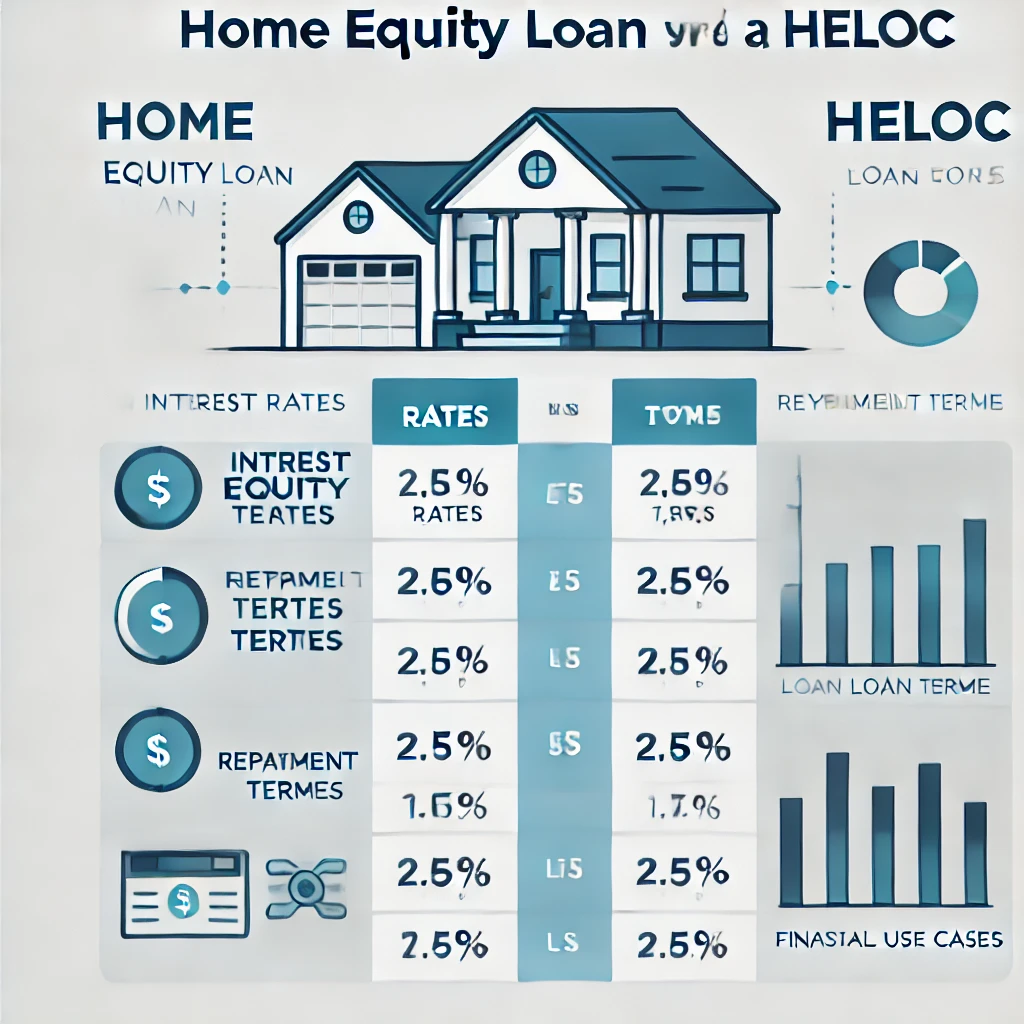When it comes to leveraging the equity in your home for financial needs, two popular options stand out: a Home Equity Loan and a Home Equity Line of Credit (HELOC). While both provide access to cash based on your home’s value, they function differently and cater to distinct financial situations. In this guide, we’ll break down the differences, benefits, and drawbacks of each to help you make an informed decision.
What Is a Home Equity Loan?
A Home Equity Loan is a type of lump-sum loan that allows homeowners to borrow against the equity in their property. This loan has a fixed interest rate, fixed monthly payments, and a set repayment term.
Pros of a Home Equity Loan:
- Fixed Interest Rate: Predictable monthly payments make budgeting easier.
- Lump-Sum Payout: Ideal for large expenses like home renovations, debt consolidation, or medical bills.
- Tax Benefits: Interest may be tax-deductible if used for home improvements.

Cons of a Home Equity Loan:
- Higher Interest Rates Compared to HELOCs: Fixed rates are often slightly higher.
- Less Flexibility: Borrowers receive a lump sum rather than access to revolving credit.
- Risk of Foreclosure: Failure to repay can lead to losing your home.
What Is a HELOC?
A Home Equity Line of Credit (HELOC) is a revolving credit line that allows homeowners to borrow money as needed, similar to a credit card. HELOCs typically have variable interest rates and a draw period (usually 5-10 years), followed by a repayment period.
Pros of a HELOC:
- Flexibility: Borrow only what you need, when you need it.
- Lower Initial Interest Rates: Often lower than home equity loan rates.
- Interest-Only Payments During Draw Period: Helps manage short-term cash flow.
Cons of a HELOC:
- Variable Interest Rates: Monthly payments can fluctuate, making budgeting difficult.
- Risk of Overspending: Easy access to credit can lead to unnecessary borrowing.
- Potential for Higher Costs: Interest rates may increase over time, raising repayment amounts.
Key Differences: Home Equity Loan vs. HELOC
| Feature | Home Equity Loan | HELOC |
|---|---|---|
| Type of Loan | Lump-sum loan | Revolving line of credit |
| Interest Rate | Fixed | Variable |
| Repayment | Fixed monthly payments | Flexible payments during draw period, then fixed repayments |
| Best For | One-time large expenses | Ongoing or unpredictable expenses |
| Risk Factor | Foreclosure if payments are missed | Foreclosure if payments are missed, but also risk of rate hikes |
Which One Should You Choose?
The right choice depends on your financial situation and goals:
- Choose a Home Equity Loan if you need a large, predictable loan with fixed payments.
- Choose a HELOC if you need ongoing access to funds and can manage fluctuating payments.
How to Qualify for a Home Equity Loan or HELOC
To qualify for either a Home Equity Loan or a HELOC, lenders generally require:
- At least 15-20% equity in your home
- A good credit score (typically 620 or higher)
- A low debt-to-income (DTI) ratio
- Stable income and employment history
Having a higher credit score and lower DTI can help you secure better interest rates and terms. Additionally, lenders may require a home appraisal to determine your property’s current market value.
Tips for Choosing the Right Option
- Assess Your Financial Needs: If you need a lump sum for a one-time expense, a Home Equity Loan may be better. If you need ongoing access to funds, a HELOC is preferable.
- Compare Interest Rates: Fixed rates provide stability, while variable rates may start lower but can increase over time.
- Consider Repayment Terms: A Home Equity Loan has structured payments, whereas a HELOC offers flexibility during the draw period but requires discipline to avoid overspending.
- Review Fees & Closing Costs: Both options may come with closing costs, appraisal fees, and potential prepayment penalties.

Final Thoughts
Both Home Equity Loans and HELOCs offer excellent ways to tap into your home’s equity, but they serve different financial needs. Before deciding, consider your budget, interest rate preferences, and how you plan to use the funds. Consulting a financial advisor can also help you make the best decision for your financial future.

